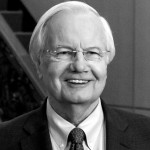JACK ABRAMOFF: And so it is to our party that they come. It is with us that they trust their dreams. And it is in us that they place their hopes.
BILL MOYERS: By November 1994, 10 years later, Republicans won eight new Senate seats and a whopping 52 seats in the House. The conservative revolution imagined by the College Republicans was embodied in the new Speaker of the House, Newt Gingrich . And at the center of the action was Grover Norquist.
Norquist had created Americans for Tax Reform, which he turned into the movement's nerve center. Once a week, Congressional staff, party activists, and rightwing think tankers held strategy sessions in his office. It was Norquist who concocted a grand scheme to turn Washington into a Republican company town by making sure only Republicans were hired as lobbyists and lobbyists contributed only to Republicans. He dubbed it The K Street project, after the lobbyists' main drag downtown. It paved the way for Jack Abramoff. "What the Republicans need," said Norquist, "is 50 Jack Abramoff's. Then this becomes a different town."
MICHAEL WALLER: They were probably about as inseparable as two political people can get. Jack had left Washington. He didn't have the day-to-day contact with his networks. So if Grover vouched for him, then Abramoff was fine.
BILL MOYERS: Abramoff had gone to Los Angeles, but he returned to town to work for a prominent firm, which announced his hiring by touting the lobbyist's ties to the Republican National Committee, the new leaders of the House, Newt Gingrich and Tom DeLay, and the Christian Coalition now headed by his buddy Ralph Reed. But no one was more indispensable to Abramoff than Norquist.
MICHAEL WALLER: If it wasn't for his relation with Grover Norquist, Jack Abramoff would never have been able to become the super lobbyist that he came. And to charge the huge rates that he charged because he had this unique relationship with certain Republican leaders.
BILL MOYERS: The hefty fees would enrich Abramoff, who in turn would direct his clients to enrich the right-wing's political machine. One of those clients was the wealthiest gambling tribe in America, the Mississippi Choctaw. To keep their huge casino earnings from being taxed, the tribe needed help in Washington. So Abramoff turned to Norquist, who had just what the tribe was looking for: an organization dedicated to opposing all tax increases. So the two old college comrades framed the casino tax as a tax increase that conservatives should on principle oppose. Activists at Norquist's weekly meetings suddenly found themselves discussing Indian tribes.
MICHAEL WALLER: We didn't know one tribe from another. So what. Let them have their casino. We didn't know. Nobody knew they were multi-billion dollar entities. It's not something anybody paid attention to.
BILL MOYERS: But Norquist was paying attention. And to lobby for their cause he had the Choctaw put up the money to organize anti-tax groups across the country.
MICHAEL WALLER: Why in the world would Grover Norquist care about, care so deeply about Indian tribes, unless there was something else going on. We all suspected something pretty fishy.
BILL MOYERS: The Choctaw became a major contributor to Norquist's organization. And Norquist, in turn, was moving some of that money to the third member of that old College Republican troika, Ralph Reed. As the pious head of the Christian Coalition, Reed publicly opposed gambling.
RALPH REED: This reflects what we believe is one of the greatest cancers growing on the American body politic -- and that is the scourge of legalized gambling.
BILL MOYERS: But by the mid-1990s, after leaving the Christian Coalition, Reed had set up his own political consulting firm. He sent an email to his old friend Abramoff, who was now known on K Street as "Casino Jack." This is what Reed wrote:
RALPH REED: "Hey, now that I'm done with electoral politics, I need to start humping in corporate accounts! I'm counting on you to help me with some contacts."
BILL MOYERS: Abramoff came through. He and Reed teamed up in a campaign to protect the Choctaw casino against competition from other tribes. The scheme called for Reed to organize his fellow Christians to oppose new casinos on moral grounds -- without ever revealing to them that his own client, "Casino Jack" was in the gambling business, too. Emails between them make clear where the money came from. When Reed pushed for a "green light" to organize Christians in Alabama against gambling, Abramoff said approval would first have to come from the Choctaw, and demanded:
JACK ABRAMOFF: "... get me invoices as soon as possible so I can get Choctaw to get us checks asap."
Next Page 1 | 2 | 3 | 4 | 5 | 6 | 7 | 8 | 9
(Note: You can view every article as one long page if you sign up as an Advocate Member, or higher).





